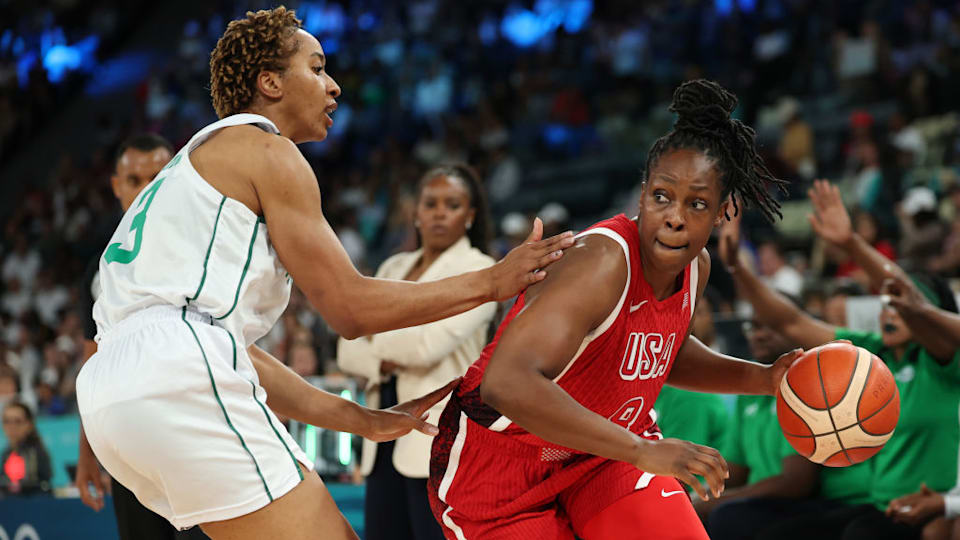USA keeps earning 'respect,' dispatches Nigeria in Olympic women's basketball quarterfinal

Team USA took care of business against upstart Nigeria on Wednesday, 7 August, at Bercy Arena, making its first appearance in the knockout round of the Olympic women’s basketball tournament because of a tenacious and relentless style.
The Americans weren’t looking for style points here, and that didn’t happen. The 88-74 victory in this quarterfinal at Olympic Games Paris 2024 was probably closer than many expected. That’s because the Nigerians played until the final seconds, literally.
After Team USA’s Kahleah Copper dribbled out the shot clock on its final possession, the expectation was that Nigeria would do the same. Instead, Ezinne Kalu drove to the basket for a layup and Copper took issue with trying to score when the game was decided. Point differential is no longer a factor after group play.
Copper threw the ball at Kalu and drew a technical foul, and Nigeria made the final score even closer. Yet, the United States did its job, using depth and balanced scoring to take care of an inferior opponent.
“It was unfortunate, a misunderstanding maybe of sorts,” USA coach Cheryl Reeve said. “We took a turnover on the shot clock, so we expected they would dribble the clock out. Apparently their coach told Kalu to go ahead and go score. We just explained that was probably not the most respectful thing to do.”
The win streak for Team USA is now at 59 in the Olympics, and this roster of WNBA all-stars and some Olympic staples are trying to incrementally improve as the tournament progresses.
The next text comes Friday against Australia.
Jackie Young of the USA drives past Ezinne Kalu of Nigeria in Olympic women's basketball action on 7 August 2024 at the Olympic Games Paris 2024.
“We got a lot of great contributions from everyone and we know how big each game is,” USA forward Breanna Stewart said. “We know Nigeria’s style and the way that they play, so just being prepared for the physicality. We knew that after halftime they were going to try to bring it up another notch and give everything they’ve got. But the way that we move the ball, the way we get out in transition really negates all of that.”
Reeve inserted Jackie Young into the starting lineup over Diana Taurasi, and it gave the club an early spark.
“She's playing the way we want to play,” Reeve said of Young. “Both ends of the floor and it's time to get to that space where we understand that if we don't win, we go home. She's terrific. She gets the space that she wants to get to, she's persistent, plays the schemes, great help defender, great rotator, great rebounder. She does a lot of things well.”
For Nigeria, it represented itself well in the Olympic tournament and against Team USA. Promise Amukamara, a former WNBA draft pick, led Nigeria with 19 points. Kalu, an eight-year veteran of the Nigerian national team, added 16 and gleamed with pride after the team’s performance.
“I'm proud of what we've accomplished so far,” she said. “In order to be the best, you have to beat the best. And unfortunately, we fell short today, but I think people will remember who Nigeria was today.
“It's a huge, huge, huge accomplishment. So many times, people have looked away from Nigeria basketball, even women's basketball in general. And to come to this tournament and put on the performance we did, I'm pretty sure that the eyes are on Africa now.”
Nigeria coach Rena Wakama, a former college player who accepted the national team coaching job at age 31, sees her program ascending in the FIBA ranks and said she’ll use this experience as a building block. African basketball came out big winners in this Olympic tournament with the success of Nigeria and the South Sudan men.
“It's a movement for Nigeria and for Africa,” she said. “I've been saying this whole time we have so much talent and I hope the world can see what we're capable of doing if we invest in ourselves, if we invest in Africa, if we invest in sports — we're capable of being at the highest levels.”
Team USA was more experienced, polished and steady, but the players were impressed with the progress of Nigeria, which lost all three games at Tokyo 2020 by a combined 53 points.
“I have a super young team; we've only been together for a year,” Wakama said. “A lot of these kids — a few of them have played at this level, but some of them haven't. Just continue to get some experience. Go to more tournaments and spend more time to drum that chemistry together.
“We need more time. The skill is there, the fight, the heart is there, but we just need more time together. We need funding. Everything comes down to funding.”
Gary Washburn is an Olympic channel correspondent and national NBA writer for the Boston Globe.